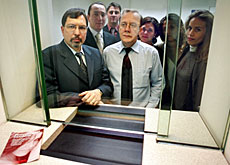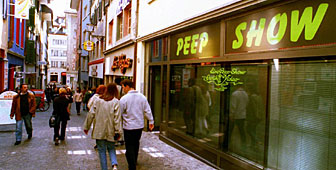Women trafficking crackdown hits home

A campaign launched by the Swiss embassy in Moscow to prevent women from being drawn into Switzerland’s sex industry is proving effective.
Since the embassy launched the information campaign last year, the number of bogus visa applications has dropped dramatically.
“The number of visa applications we had to reject due to false information has dropped from 220 in 2002 to a mere 77 this year,” said Felice Bobbia, head of the visa section of the Swiss embassy in Moscow.
The information campaign was launched in cooperation with “Angel Coalition”, a Russian non-governmental organisation, which held seminars to raise awareness about trafficking among embassy staff.
“We know that women often travel to Switzerland as tourists and once they get there, their passports are confiscated and they are forced to work as prostitutes,” Tania Dussey-Cavassini of the Swiss embassy in Moscow told swissinfo.
False promises
Many women are lured by adverts promising to find them a rich husband or a well-paid job. Russian newspapers are full of advertisements promising young women a better life abroad.
“The stories are often the same. It’s either a country girl on a skiing trip or it’s five 18-year-olds going on a management seminar in Verbier,” explained Bobbia.
“They often believe they are really going skiing or there is a Swiss husband waiting for them.”
He recalled a recent incident when he interviewed eight young Russian women who claimed to be members of a sports club wanting to go on a skiing trip to Switzerland.
“After asking them all sorts of questions we found out that they didn’t really know each other and that they had no idea where exactly they were going,” said Bobbia.
Stricter regulations
Apart from the information campaign and seminars, the Moscow embassy has also introduced stricter rules for granting visas. The Swiss embassy in Moscow issues around 60,000 visas per year.
Under the new regulations, applicants aged between 18 and 25 have to turn up for an interview.
Another new regulation is that travel agencies arranging group trips to Switzerland have to be registered with the embassy. If they are caught arranging bogus visas they are blacklisted immediately.
According to Bobbia, 20 out of registered 350 travel agencies have already lost their accreditation.
Women’s fate
Even though the number of bogus visa applications has fallen significantly since last year, Dussey-Cavassini concedes that Russian traffickers are still able to get women into Switzerland.
“They can apply for a visa for another country and get into Switzerland overland – this happens quite often,” she told swissinfo.
“But realising that we cannot actually fight this problem on our own should not discourage us from doing something about it. We have to get other embassies to join our efforts,” she added.
The alarm bells appear to have been heard by other embassies in Moscow: the Dutch, Norwegian and Finnish embassies have sent their employees on training seminars.
Such has been the success of the Moscow embassy initiative that staff at Swiss missions in Kiev and the Colombian capital, Bogota, are undergoing similar trafficking awareness training.
swissinfo, Alexandra Stark in Moscow (adapted from German by Billi Bierling)
The Swiss embassy in Moscow issues around 60,000 visas per year.
The embassy has cut by two-thirds the number of bogus visa applications.
Staff at other Swiss missions in the Ukrainian city of Kiev and the Colombian capital, Bogota, are also receiving trafficking awareness training.

In compliance with the JTI standards
More: SWI swissinfo.ch certified by the Journalism Trust Initiative









You can find an overview of ongoing debates with our journalists here . Please join us!
If you want to start a conversation about a topic raised in this article or want to report factual errors, email us at english@swissinfo.ch.